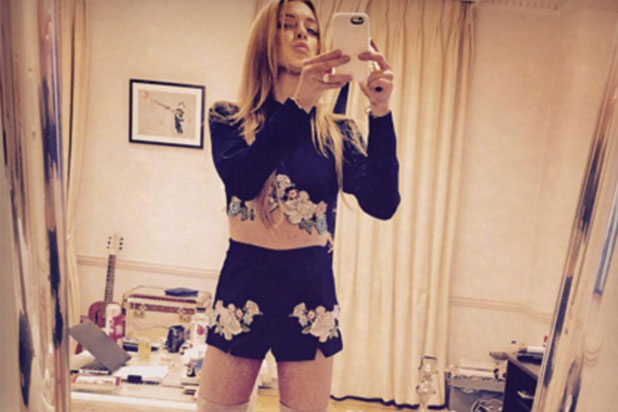Welcome back to TMZ Theory, in which writer Philippa Snow takes a deep-drive into the stranger corners of celebrity and fame.
Once Upon a Time in Hollywood — a film whose title I refuse to reproduce with its ellipsis, in the same way I refused to honour Lars Von Trier’s eccentric punctuation when he called his movie Nymph()maniac — had not yet been released in UK cinemas when I sat down to write this. Still, I find myself already knowing too much: that its female characters speak roughly 27 percent of its dialogue; that it’s “enjoyably heterogeneous”, “bittersweet [and] complex”, “Tarantino at his revisionist worst”, obscenely regressive” and “Tarantino’s #MeToo moment”; that the film’s version of Sharon Tate is “reduced…[to a] cardboard cut-out,” a device ensuring that the movie functions as “a love-letter to Sharon Tate”, a “Dream-Girl”; that above all else, there are prominently–featured dirty feet. While I am certain there have been films released in the last 12 months that have produced the same level of online discord, I am struggling to recall them. (It’s entirely possible that to protect my sanity, my brain has — Tarantino-like — rewritten history in order to prevent me from remembering the hottest, dumbest takes.) When male journalists start counting how few lines are spoken by a woman in a movie, as if the two-hour-plus Sex and the City sequel’s many, many instances of female dialogue might make it more feminist by comparison, you know the promotional cycle has left everyone at least a little nuts.
“It is unsettling and unknowable when someone trashes something of great value, the way she has with her acting career, and equally hard to guess how self-aware someone is when they are extremely famous.”
So, no: I can’t yet say whether the Tarantino version of Tate gets enough dialogue, or appears three-dimensional, or has particularly cinematic feet. I can say that even given the extraordinary fuckedness of the subject matter — namely, the ritual murder of a famous, pregnant woman by a group of cult inductees — Once Upon a Time in Hollywood’s depiction of the final days of Sharon Tate was never likely to outdo this year’s earlier, Hilary-Duff-starring The Haunting of Sharon Tate in terms of bad taste. Casting the adult Lizzie Maguire as a psychic version of the actress would have been the most bizarre take on the subject imaginable, in fact, if it were not for a historic Instagram post made by Lindsay Lohan on 12 November 2015. In the shot, Lohan has blonde hair and long beige boots, and is wearing a crop-top-and-hotpants combo designed to invoke the 60s, or at least to gesture at them from afar. “I LOVE SHARON TATE,” she hollers in the caption, “#CANCERmeetsAQUARIUS #themelook #hippieWINTERCHIC.” Complicating things, the post went live on the 81st birthday of Charles Manson.

In the four years since it did, I have spent more time than is reasonable considering Lindsay’s motives, and have never found the answer. (I was not being ironic, or at least not totally ironic, when I added “Lindsay Lohan scholar” to my various social media bios.) Truthfully, there is perhaps no subject I have written about more than Lindsay Lohan, with part of the reason being her inscrutability: it is entirely possible that on 12 November 2015, she had seen some post commemorating Tate appear on social media and not paid much attention to the caption, and it is also a possibility that she knew why 15 November was a date of some significance, and chose to sow the seeds of chaos anyway. It is unsettling and unknowable when someone trashes something of great value, the way she has with her acting career, and equally hard to guess how self-aware someone is when they are extremely famous.
In the last film released in her lifetime, the spoof-comedy The Wrecking Crew, it is usually said that Tate is the best, funniest thing in it. She made it at 25 years old, and the next year she died, leaving her status as a gorgeous woman who could also do physical comedy as a suggestion, when it might otherwise have been a sure thing. Hers is not an unfamiliar or unprecedented story, even if in her case it ended in tragic and premeditated murder. If I say that there are many gorgeous women who can also do physical comedy who do not end up becoming or remaining a sure thing in the industry, sometimes because they are dogged by dark events, I believe I can trust you to put two and two together.
In the Nerdist article that calls Once Upon a Time in Hollywood “a love letter to Sharon Tate”, the critic Lindsay Romain calls the real Tate “beautifully unknowable”, too. “Unlike snuff films like The Haunting of Sharon Tate or the various adaptations of Helter Skelter,” she continues,“ Once Upon a Time in Hollywood isn’t preoccupied with her status as a murder victim. It’s interested in her life, her career, and the infectious joy she conjured for those around her…[it’s] occupied with the magic Tate promised, not the tragedy we’ve used to define her.” Reading this, I finally figured that the most generous reading of that Instagram post is as a suggestion of the same thing: that as Tate’s own sister Deborah has suggested, Manson and his family are “nothing that should be regarded in any way, shape or form”. The caption and the gesture are still in extraordinarily bad taste, and too flip to be taken seriously as a tribute. Still, there is a minor victory in denying the birthday and existence of one of the age’s most fame-hungry murderers in one fell swoop. What remains is the same kind of online eulogy typically directed at Marilyn, or Audrey Hepburn, or Liz Taylor, or any of classic Hollywood’s other canonised stars. Or else: it’s less a selfie, more a conceptual self-portrait, like Gillian Wearing dressing up as the late Claude Cahun to denote twinship.
